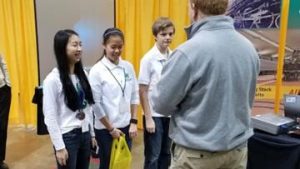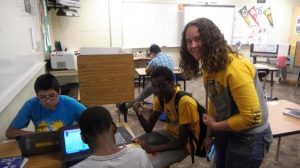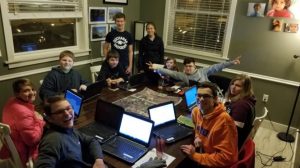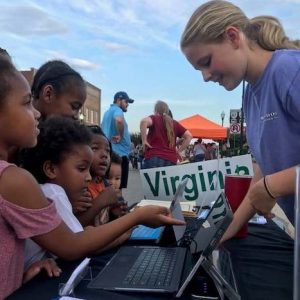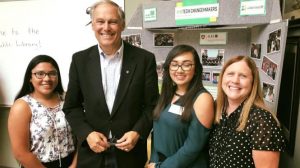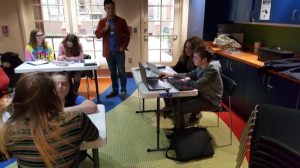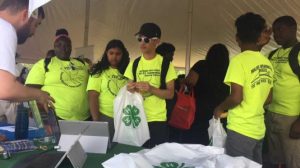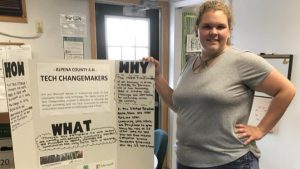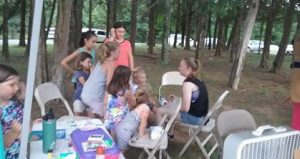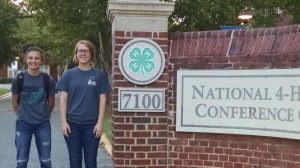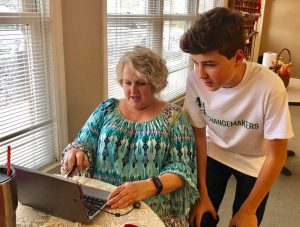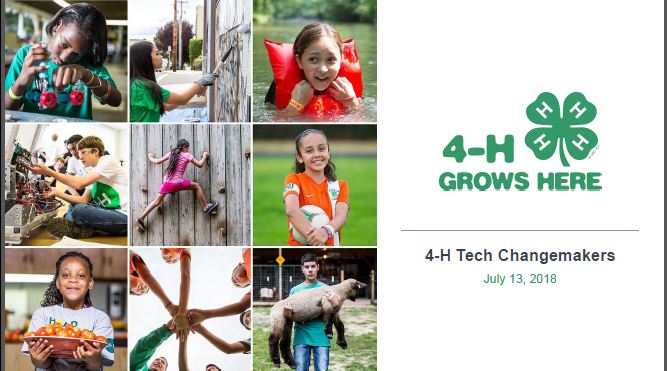Brown, Wisconsin
After performing a needs assessment to discern where their impact would be greatest, the Brown County Tech Changemakers hosted a STEMnition exploration event at Lombardi Middle School. This event taught local middle schoolers how to code computer games, control robots, explore microscopic animals and included other STEM related activities. The youth developed and implemented lesson plans for this event and even created a video, explaining their journey with Microsoft and their project. The crew is now working towards developing a STEM after school program for middle schoolers led by high schoolers and they are working on an educational kit that can be used for after school programming.
Washington, Maine
This team has been addressing food insecurity and local food awareness in their community. They have created a website called Community Feast, that includes a newsletter, short stories on local efforts, involvement opportunities and a “Get to Know Your Farmer” section. The team started a gardening club at their high school and they have already organized several successful work days. The team hopes to start a weekly delivery of organic salad mix to food pantry recipients by the spring. The team plans on further developing the website and organizing more hands-on activities such as a school greenhouse, to engage more young people in making local food accessible.
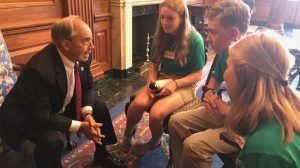
Congressman Bruce Poliquin was very interested to hear about the 4-H Tech Changemakers project and even asked how he could help.
Cass County, North Dakota
North Dakota 4-H members are giving computer science opportunities to local residents, particularly new Americans. To achieve this the youths have established regular STEM programs that occur twice a week and host around 70 youths at two different sites that reach culturally diverse audiences. The 4-H youth serve as teachers and have established new relationships with middle schoolers. They also hosted an Hour of Code event that had 1,000 youth participants; 4-H members presented at this event gaining presentation and teamwork skills.
Outagamie, Wisconsin
The Outagamie 4-H Tech Changemakers were concerned that Oneida youth were becoming disconnected from their heritage and culture. To solve this issue the team met with Oneida tribal elders and gathered information on Oneida culture. They then developed a Minecraft world that virtually represented Oneida culture. The team also held a Growing Our Future Agricultural Expo in June 2018 where 32 youths explored the Minecraft world and then visited the real 4-H land and learned how to plant indigenous crops. The 4-H members are now addressing the issue of pedestrian accidents at crosswalks. They hope to solve this issue through promotional campaigns and developing technology that will alert distracted pedestrians of crosswalks.
Mecklenburg, Virginia
The Mecklenburg 4-H Tech Changemakers have developed a digital literacy education program for elementary and middle school students. To do this the youth taught after-school workshops and led camps on coding and video game design. The team also trained K-12 teachers who plan to implement coding lessons in the fall. Just recently the team also launched a video game design competition that has sparked the interest of many students and the team plans on hosting more workshops.
Quincy, Washington
The Washington 4-H team is helping local adults improve their digital literacy in an effort to close the generation gap. After conducting a technology needs assessment, the team created a digital skills literacy class series. The youths planned and implemented lesson plans and the first class gave 10 adults new and useful skills, built connections between youths and adults and gave team members presentation and public speaking experience. The team also developed a flyer that is published in both English and Spanish.
Washtenaw County, Michigan
This 4-H Tech Changemakers group wants to address the issue of mental health among local high school students. They are working to create a supportive environment for teens dealing with mental health issues to access useful resources. In the summer of 2018, they partnered with the City of Chelsea and piloted a Teen Tech Café: a safe space to engage in meaningful discussions on mental health and a place to access resources on mental health, they hope to spread word about the Café by developing a website and an app. Because of their work with mental health the local hospital added to its teen health budget, showing that they have already advanced the conversation on teen mental health.
Wayne County, Michigan
The Wayne County 4-H Tech Changemakers sought to connect young adults to positive after-school environments that dealt with substance abuse counseling. They first developed a survey to learn more about community experiences with substance abuse. Using this data they decided to sponsor a viewing of the film Chasing the Dragon and facilitated a discussion on the film afterwards. The team also hosted an all-day hack-a-thon and they plan to create a website to make substance abuse resources more readily available to community members and to engage young people in creating positive information.
Alpena County, Michigan (New in 2018)
The Alpena County 4-H Tech Changemakers want to increase public awareness and use of the Great Lakes through videos they are developing for the Great Lakes Fisheries Trail website. These videos will highlight the many recreational opportunities available at the Great Lakes as well as serve to educate people on ways they can help reduce the threat marine debris has to fish.
Charlotte, Virginia (New in 2018)
The Charlotte Virginia 4-H Tech Changemakers hope to create programs that will increase digital literacy skills and create computer science and other career awareness. They are currently working to develop after school lesson plans to educate younger students on programming as well as community workshops to educate local farmers on how technology could help them run more efficiently.
Laramie County, Wyoming (New in 2018)
The 4-H Tech Changemakers in Wyoming are developing digital literacy events aimed at local seniors. The team has noticed that a prevalent issue in their community is the isolation of their rural town. With no newspaper, it is difficult for seniors to stay connected with the community, family and even local resources. This team hopes that by providing seniors with the tools and skill necessary to use the internet, seniors will become more connected with community events.
Murray County, Georgia (New in 2018)
The Murray County team wants to address the digital divide in their community. To do this they conducted a “Getting to Know Your Device” event at the Murray County Senior Center. This event had 20 youths teaching 26 seniors how to use their devices, with one-on-one training that focused on everyday technology use. After the success of their first event the team has planned sessions for the next nine months to take place at the senior center and at their local libraries.
National Impact:
The eight teams from year one created brief presentations to share highlights of their work so far
